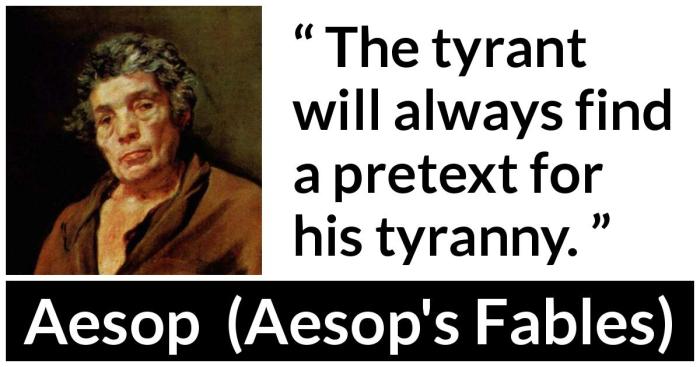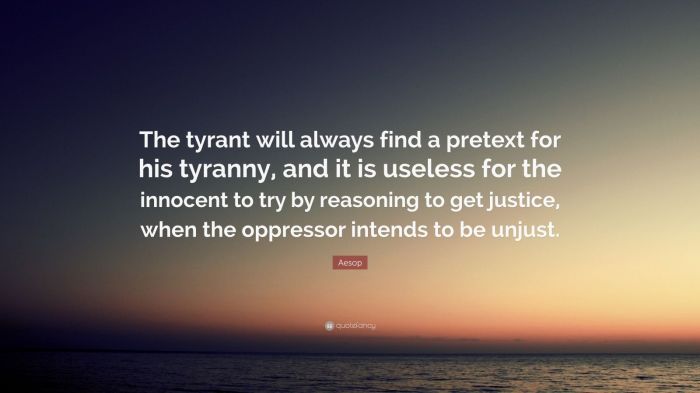Throughout history, tyrants have invariably resorted to pretexts to justify their oppressive rule. From ancient despots to modern dictators, the pattern remains consistent: a tyrant will always find a pretext for his tyranny.
This essay delves into the historical, psychological, and methodological aspects of tyrannical pretexts, examining their consequences and exploring strategies for countering them.
Historical Examples

Throughout history, tyrants have employed various pretexts to justify their authoritarian rule. Some common examples include:
- National security:Tyrants often claim that their actions are necessary to protect the nation from external or internal threats, even when such threats are exaggerated or fabricated.
- Economic instability:Tyrants may use economic crises as a pretext to implement austerity measures that disproportionately impact vulnerable populations.
- Moral decay:Tyrants may portray themselves as guardians of morality, justifying their suppression of dissenting voices and erosion of civil liberties in the name of preserving traditional values.
- Historical grievances:Tyrants may exploit historical events or perceived injustices to create a sense of victimhood and justify their repressive policies.
Psychological Mechanisms, A tyrant will always find a pretext for his tyranny
The psychological mechanisms that drive tyrants to seek pretexts for their actions include:
- Fear:Tyrants may use pretexts to assuage their own insecurities and fears of losing power or being overthrown.
- Insecurity:Tyrants often feel threatened by perceived challenges to their authority, leading them to seek pretexts to eliminate or suppress any potential threats.
- Power dynamics:The power dynamics within tyrannical regimes can create a culture of fear and intimidation, where individuals are reluctant to question or challenge the leader’s actions, allowing pretexts to go unchallenged.
Methods of Pretext Creation
Tyrants employ various methods to create pretexts for their tyranny, including:
- Manufacturing crises:Tyrants may deliberately create or exacerbate crises, such as economic instability or social unrest, to justify their authoritarian measures.
- Controlling the media:Tyrants often control the media to disseminate propaganda and suppress dissent, shaping public opinion to support their pretexts.
- Exploiting fear and paranoia:Tyrants may use fear-mongering and propaganda to create a sense of insecurity and paranoia among the population, making them more receptive to pretexts.
- Co-opting language:Tyrants may use language and rhetoric to manipulate public opinion and create a sense of legitimacy for their pretexts.
Consequences of Tyrannical Pretexts
Tyrannical pretexts have severe consequences for individuals, societies, and the rule of law:
- Undermining trust:Pretexts erode trust in government and public institutions, as citizens become disillusioned with the manipulation and deceit.
- Erosion of civil liberties:Pretexts often lead to the erosion of civil liberties, as governments use them to justify surveillance, suppression of dissent, and arbitrary detention.
- Justification of human rights abuses:Tyrants may use pretexts to justify human rights abuses, claiming that their actions are necessary to protect the nation or maintain order.
Countering Tyrannical Pretexts
Countering tyrannical pretexts requires a multi-pronged approach:
- Education:Educating citizens about the tactics used by tyrants to create pretexts can help them recognize and resist manipulation.
- Critical thinking:Promoting critical thinking skills enables citizens to evaluate information objectively and challenge claims that are not supported by evidence.
- Civil society:A strong and vibrant civil society can play a crucial role in holding governments accountable and exposing tyrannical pretexts.
Popular Questions: A Tyrant Will Always Find A Pretext For His Tyranny
What are some common pretexts used by tyrants?
Tyrants often use pretexts such as national security, economic crisis, or social unrest to justify their actions.
How do tyrants create pretexts?
Tyrants may fabricate threats, manipulate information, or exploit existing fears to create pretexts.
What are the consequences of tyrannical pretexts?
Tyrannical pretexts can undermine trust, erode civil liberties, and justify human rights abuses.


